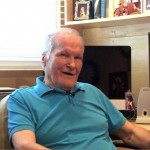 Chuck Blore describes his “revenge” when he discovered KABC Radio/Los Angeles was stealing Blore’s radio programming memos to the KFWB Color Radio air staff.
Chuck Blore describes his “revenge” when he discovered KABC Radio/Los Angeles was stealing Blore’s radio programming memos to the KFWB Color Radio air staff.
September, 1996:
I embarked upon my second week-long seminar trip to New Zealand, where for the second consecutive year I was a guest speaker at the Radio Broadcasting Association’s annual convention.
Prior to the convention, however, I was scheduled to present several days of seminars for different NZ radio groups…starting with two days in two different cities for Radio New Zealand.
The first seminar was scheduled for Monday in Christchurch. To get there, I flew 14 hours from Los Angeles to Auckland, waited three hours at the airport, and then flew on to Christchurch…arriving at 10 o’clock Sunday morning.
For some reason, before leaving L.A. I had been unable to find out from my hosts what hotel I would be staying at in Christchurch. But I was told not to worry, because a limo driver would be waiting for me at the airport and would know where to take me. All I had to do was look for someone holding a sign with my name on it.
When I got off the plane in Christchurch, I didn’t see my name on any sign.
I went to Baggage Claim; I didn’t see my name.
I collected my bags and searched the entire terminal, unsuccessfully, for someone holding a sign with my name on it.
After 20 hours of traveling, bleary-eyed and exhausted, I was stuck at the Christchurch airport.
On a Sunday morning.
Not knowing into what hotel I was booked.
And not knowing anyone in Christchurch whom I could call for help.
My Radio New Zealand host, David Brice, lived in Auckland and wouldn’t be in town until the following morning. And at the time I didn’t know the name of the limo company that was supposed to have met me. (For the record, it was “Corporate Taxi.”)
I found the United Airlines lounge and beseeched them to call Directory Assistance for Auckland, in the hopes of locating David’s home number. (At this point, I did not have either the mental or emotional strength to figure out how to use a pay phone to call directory assistance in another city.)
It was here that my luck began to change: There was a David Brice in an Auckland suburb.
The sympathetic lounge staffer called the number for me.
A woman answered. Yes, this was the David Brice residence. Yes, the David Brice who works for Radio New Zealand. David wasn’t in, but I had reached his wife.
She was very nice and properly horrified to learn of my predicament. Mrs. Brice took down my phone number (i.e., at the UA lounge) and promised to call me back. And it wasn’t very long before she did so, having somehow found out the name of my hotel.
The next day’s seminar went quite well, and upon arriving that evening in Auckland for the following day’s seminar I was shocked to find myself ensconced in a suite at the Carlton Hotel.

Yes, this is typical of my hotel accommodations. (Sorry you can't see the second level of this townhouse suite.)
Not just a suite. This was A Suite.
Huge. Gigantic. Luxurious.
I don’t know who the hotel thought I was, but I didn’t bother to correct them. (As usual, though, I was there just long enough to sleep and to gawk at the furnishings.)
Alas, changed luck is ephemeral. Jumping ahead to the next evening, when a car had been arranged to take me to the airport: The driver from “Corporate Taxi” never showed up….
A Loyal Reader Writes:
“I want my phoners to be interesting, so I try to milk them for funny stuff that I lead them toward by asking questions. If I don’t lead them, they won’t say anything interesting.
“My boss wants me to edit out the parts where I lead them, but I want the listeners to know that it’s me who thinks of this stuff. I don’t want my callers to get the credit for my ideas. If I edit, that’s how it’ll sound. What’s your suggestion?”
Why should you care who gets the credit? It’s your radio show, so ultimately you get the credit (or blame).
In fact, one way in which it’s always been easy to spot jocks who are really good at on-air phone calls is that their listeners always appear to be smarter than other jocks’ listeners….
 Unless you’re doing “Institutional” or “Image” advertising — which ad agencies love but which usually are bad investments for advertisers — your advertising should have a clear Call to Action.
Unless you’re doing “Institutional” or “Image” advertising — which ad agencies love but which usually are bad investments for advertisers — your advertising should have a clear Call to Action.
A “good” commercial is one that motivates the listener to act on the sales message. (As David Ogilvy said, “Don’t tell me you love my ad. Tell me you bought the product.”)
There is nothing as powerful as a Sense of Urgency to motivate people to act. (That is why it is far easier to sell a cure than it is to sell a prevention.)
“Limited supply” — if genuine and if communicated convincingly — can lend a sense of urgency to a sales offer. (Think about past holiday seasons when parents frantically ran all over town, searching for the nearly-impossible-to-find “Tickle Me Elmo” or “Cabbage Patch” dolls.)
The limited supply might refer to the product itself. Or it might refer to some sort of bonus and/or Gift With Purchase.
Another very strong incentive to act is embodied in a deadline.
In the U.S., we are required to report our income to the Internal Revenue Service. For individual taxpayers, the annual deadline for filing their tax returns is April 15.
Based upon a completely nonscientific survey I’ve made of people I’ve met in life, I’d estimate that 43% of American taxpayers mail their income tax returns on April 14 or 15.
Why do they wait so long?
Is it because April 15 is just too darned early in the year? If income tax returns weren’t due until, say, June 15, would everyone file their returns in May?
No. They’d file on June 14 or 15.
Why?
Because true, enforceable deadlines are among the strongest motivators known to humans. (I don’t suppose you’ve ever stayed up all night finishing a school report…or a sales proposal for which you’ve had weeks during which to prepare.)
The following is not a deadline:
“With prices like these, you know they won’t last forever!”
Neither is:
“Hurry, this sale ends soon!”
A deadline is:
“Friday night at 9.”
“December 31.”
“Tomorrow at Noon.”
Grocery stores understand this. Odds are the supermarket you patronize has weekly “specials.” They probably begin on Thursday and expire the following Wednesday.
They don’t advertise their “storewide savings.” Instead, they offer something of genuine, measurable value — a great bargain — for a very limited time.
Week after week after week.
Why?
To motivate grocery shoppers to return to their supermarkets week after week after week.
The more you can educate your clients regarding the wisdom of making genuine, valuable special offers with deadlines, the more money you can make for them.
Final installment in a series excerpted from Fundamentals of Radio Programming by Randy Michaels….

As a program director, you should think through your Clock Technology.
Typically we build categories, and most of the Selector databases I see have Power Currents, Secondary Currents, New Currents, maybe some Night Currents.
When you get to a certain test score, you move it to Power. Then when it falls off a little, you move it back to Secondary.
I say, “Don’t do that. That’s goofy.”
Let’s say you score music on a scale of 1 to 100. And let’s say 80+ will be your “Power.”
Well, there are two very different kinds of “75’s.”
There’s the 75 that is in the “Adoption” phase. And there’s the 75 that’s in the “Decline” phase.
They might have the same value to your audience.
But Flow is one of the multiple variables in the science of radio programming.
Let’s say I’m introducing a new record.
I want to cradle it between two familiar records. Maybe a Power Current plus one of those 75’s that’s on the way down but is very familiar; it’s good to put that new record between those two.
But if also in that category I’ve got a bunch of climbing records, and now I’ve got two new records in a row.
Wrong!
By the same token, I may not want to play two sort-of-tired records back-to-back.
So it’s fine if I have a sequence of Power/Climbing B/Recurrent.
But how about Power/Declining B/Recurrent? Now I’ve got two rather tired records back-to-back.
I don’t know why every radio station in the world has a “B” category with both up and down records. You need to split them.
A “75” with higher “unfamiliar” than “burn” goes into “Climbing.”
A “75” with higher “burn” than “unfamiliar” goes into “Declining.”
I think that makes a lot of sense.
And by the way, what determines that is not Mediabase.
It’s your audience.
Do not be embarrassed if a song has been out nine weeks and is still climbing because it’s still unfamiliar to your audience.
If something the record company is still working is over or declining for you, don’t be embarrassed to move it.
You’ve got to look at your scores. But PDs in America lack the confidence to do what’s right:
“Mr. Famous PD moved that record down? I’d better move it down, too!”
I talk to PDs who are so proud: “I did just what Mr. Famous PD did.”
“Really? His market is heavily Puerto Rican with no Country listeners and you’re in the South and the Number One and Two stations in your market are Country, and you did just what he did??”
Do what’s right for your audience.
Don’t worry about national trends.


